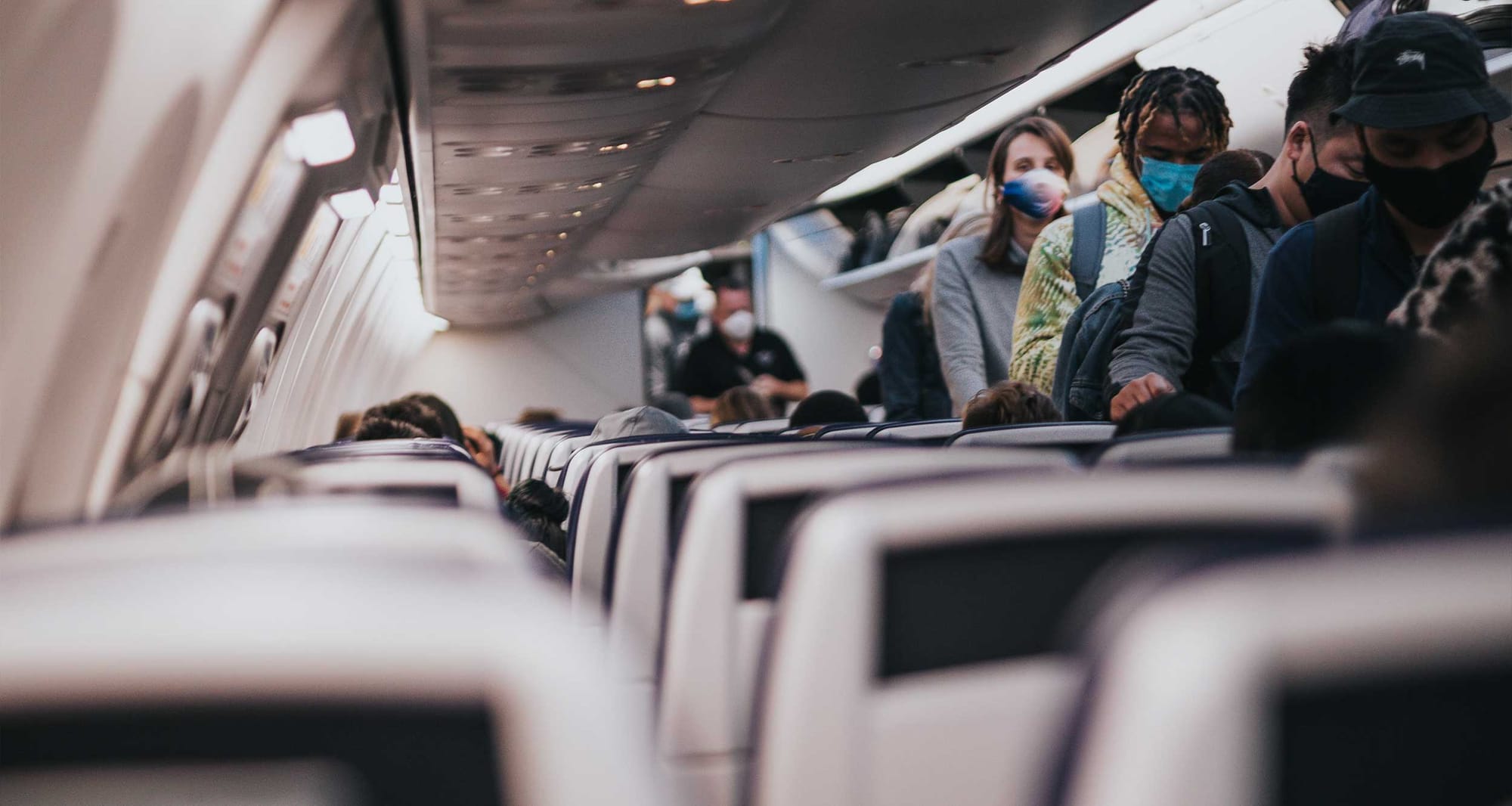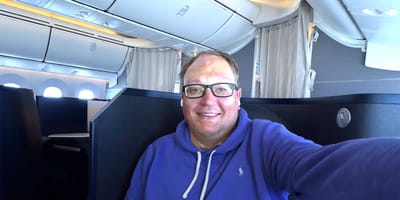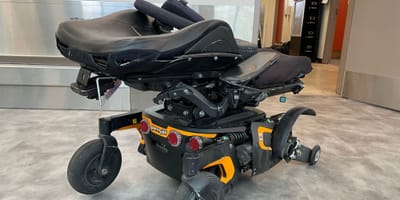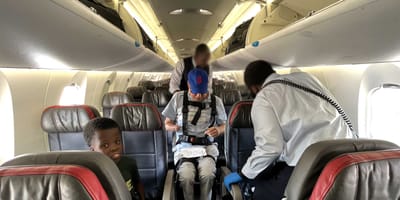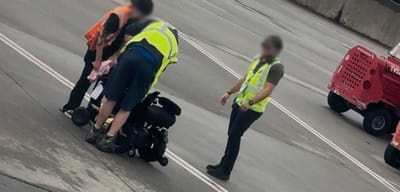One truth that is widely accepted around the world, but which has been met with skepticism and in some cases vitriol in the United States, is that some disabled people cannot wear face masks. The Southeast ADA Center, in partnership with Syracuse University, released a list of medical and psychiatric conditions that prevent mask use last year, which I shared with readers of this website.
In the Summer of 2020, airlines instituted policies requiring passengers to wear face masks. Only a handful of carriers offered an exception for disabled people — a list which grew smaller as the months wore on. Entering the new year, only two of those carriers maintained a face mask exception for disabled passengers. On this website and in interviews with the news media, I shared my belief that airlines who refused to transport disabled people who could not wear face masks were violating the Air Carrier Access Act, a civil rights law.
Recent action from the federal government suggests that I was right. On February 1, the Centers for Disease Control, under the direction of President Joe Biden, introduced new requirements for the use of face masks on interstate transportation — including on planes, trains, buses and ferries. The order stated clearly that the following groups are exempt:
- A child under the age of 2 years.
- A person with a disability who cannot wear a mask, or cannot safely wear a mask, because of the disability as defined by the Americans with Disabilities Act (42 U.S.C. 12101 et seq.).
- A person for whom wearing a mask would create a risk to workplace health, safety, or job duty as determined by the relevant workplace safety guidelines or federal regulations.
The CDC notes that the disability exception is intended to be narrow, meaning someone like me, who is disabled but can wear a mask, is required to comply, but a person whose disability prevents mask use cannot be forced to do so.
Airline policies relating to face mask exemptions for disabled people
The CDC’s order takes precedence over any airline policy that may have been in place prior to the president’s executive action. On February 5, the DOT’s Office of Aviation Consumer Protection finally informed airlines that they must grant face mask exceptions to qualified disabled people, giving carriers 45 days of immunity from enforcement action to develop necessary procedures. Some carriers intend to delay for the full 45 days, but others have already implemented policies to comply with the CDC order.
Below, you will find the current policies for disability-related face mask exceptions on the 10 latest U.S. airlines. This page will be regularly updated to include the latest information.
Alaska Airlines
On its travel advisories webpage, Alaska Airlines states that “federal law requires guests to wear a mask over their nose and mouth at all times during travel, including throughout the flight, during boarding and deplaning, and while traveling through an airport.” The airline makes no mention of an exception for disabled passengers. Because the DOT’s 45 day pause on enforcement action ends March 22, 2021, we expect that Alaska Airlines will publish a clear policy on face mask exceptions by that date.
Allegiant Air
Following the CDC’s order, the Allegiant Air policy was updated and now reads that only “only children under the age of 2 and those with limited mobility who are unable to remove a face covering without assistance are exempt” from the face mask mandate. Requests for exemption status should be emailed to ACAA@allegiantair.com at least 72 hours prior to departure.
American Airlines
Previously refusing to accommodate disabled people in violation of federal civil rights law, American has now updated its policy to list an exception for customers with disabilities. It reads:
If you may be exempt because you have a disability that prevents you from safely wearing a mask as defined by the Americans with Disabilities Act (42 USC 12101 et. seq) you must contact us at least 72 hours before you plan to travel and travel with documentation confirming a negative COVID test or recovery.
Call Special Assistance: 800-237-7976
Note that American requires a negative COVID test result or confirmation that the passenger has previously recovered from the coronavirus in order to fly. Whether this requirement is (or should be) legal is discussed later in this article.
Delta Air Lines
Delta Air Lines had previously granted waivers to the face mask requirement for disabled passengers, and its policy remains unchanged. The carrier asks customers with a disability who require an exemption to the face mask policy to arrive early “to complete a ‘Clearance-to-Fly’ process prior to departure at the airport.” The process involves a virtual consultation with a third-party medical professional at the airline’s expense.
Frontier Airlines
Frontier Airlines has published that it will grant an exception to the face mask policy for disabled passengers only if the following conditions are met:
- At least 10 days prior to departure:
- Submit documentation from a licensed medical provider on professional letterhead stating the customer is a person with a disability who cannot wear a mask, or cannot safely wear a mask, because of that disability as defined by the Americans with Disabilities Act. (Frontier Medical Form)
- State license number (or, if applicable, other medical license information) from the medical provider must be included on the letter.
- Frontier will contact your licensed medical provider to validate the document.
- Any customer who presents falsified medical documentation will be subject to suspension of their privileges for future travel on Frontier.
- Failure to provide 10 days’ notice will result in denial of the request.
- Submit documentation from a licensed medical provider on professional letterhead stating the customer is a person with a disability who cannot wear a mask, or cannot safely wear a mask, because of that disability as defined by the Americans with Disabilities Act. (Frontier Medical Form)
- At the airport on each day of travel:
- The customer must check in at the Frontier ticket counter a minimum of 2 hours prior to departure.
- Present evidence that the customer requesting a mask exemption does not have COVID-19 by providing a negative result from a SARS-CoV-2 viral test; the specimen for the test must have been collected no more than 3 days before the applicable flight. This evidence must be shown to the Frontier representative at the airport before boarding each flight.
- These testing requirements apply to return travel.
Whether these requirements are (or should be) legal is discussed later in this article.
Hawaiian Airlines
Hawaiian Airlines had previously granted waivers to the face mask requirement for disabled passengers, and its exception policy remains unchanged.
Guests who are unable to wear a face mask due to a medical condition or disability will be required to complete an assessment with a medical professional via phone at the airport. We recommend arriving at the airport early with ample time to complete the assessment, as the process may take more than one hour, and your flight will not be held. Please notify one of our Guest Services Agents as soon as you are ready to complete the medical assessment.
The mandatory telephone consultation with a medical professional is provided at the airline’s expense.
JetBlue Airways
On its coronavirus travel notices webpage, JetBlue states that “federal law requires masks to be worn by all travelers 2 years and older at all times throughout the flight including during boarding and deplaning, and in the airport.” It makes no mention of the disability exception mandated by the CDC and DOT, but we should expect that policy to be published by March 22, 2021.
Southwest Airlines
Southwest has previously refused to accommodate disabled people who could not wear a mask, but has posted the following statement to its website:
Southwest is currently finalizing steps for a Customer to take to apply for a disability-related exemption from the mask requirement. The first date Southwest would allow a Customer with an exemption to travel is March 21. When the process is finalized in the coming weeks, Southwest will post more information in this FAQ.
Southwest’s statement indicates that it intends to use the full 45 days of immunity granted by the DOT to further delay disabled people’s right to travel.
Spirit Airlines
Spirit Airlines has previously refused to accommodate disabled people who cannot wear a mask, and it continues to do so according to the following entry in its list of Frequently Asked Questions:
Spirit is aware of and analyzing a new federal directive regarding a requirement for masks to be worn in airports and onboard flights. We will promptly share any information regarding exemptions or policy changes. At this time, our current policy still stands that all guests, except children under the age of 2 years old, are required to wear an appropriate face covering.
Spirit has promised to “promptly share any information regarding exemptions on policy changes,” but three weeks has already passed since the CDC order to grant disabled people a face mask exception.
United Airlines
The policy on face mask exceptions for disabled people at United Airlines has always been murky. Previously, the only mention of an exception appeared in a July 22 press release, wherein the carrier states that “if a passenger believes that there are extraordinary circumstances that warrant an exception, they should contact United or speak to a representative at the airport.” Repeated requests for clarification were refused and, because the statement was not included on the airline’s customer-facing website, I did not believe that United was willing to serve disabled passengers who cannot wear a mask.
Following the federal mandate for an exception, I contacted the carrier by telephone to enquire about the process for receiving one. A customer service representative told me that there were no exceptions for anyone over the age of 2. I requested a supervisor, and was told that no one at the contact center could grant an exception, but that passengers should speak to a supervisor at the airport. The telephone supervisor could not say what a customer’s interaction at the airport might look like or under what circumstances an exception might be granted. She did say that “an exception is very unlikely,” even for a legitimately disabled person who cannot wear a face mask. When pressed about the lack of a clearly communicated policy and the harm that could do to disabled people, she said that if the airline published reasons for an exception, “bad people would try to circumvent the policy.”
It is my hope that United’s failure to disclose its policy will be remedied by the deadline set in the DOT’s February 5th notice. United’s previous refusal to clarify its exception policy was a clearly calculated action that violated disabled people’s civil rights, an action which WheelchairTravel.org denounces.
What barriers can airlines legally erect around face mask exceptions for disabled people?
The Department of Transportation is the final arbiter of what is legal under the Air Carrier Access Act. In its February 5th notice to airlines, the agency laid out several ways in which carriers can make traveling harder (or perhaps impossible) for disabled people who cannot wear a face mask. I have reproduced some of those below:
- Airlines are permitted to “require passengers to consult with the airline’s medical expert and/or to provide medical evaluation documentation from the passenger’s doctor sufficient to satisfy the airline that the passenger does, indeed, have a recognized medical condition precluding the wearing or safe wearing of a mask.”
- Airlines can require passengers to check-in early in order to go through the required clearance processes.
- Airlines can “require passengers with disabilities who are unable to wear masks to request an accommodation in advance.”
- Airlines can require “a negative result from a SARS-CoV-2 test, taken at the passenger’s own expense, during the days immediately prior to the scheduled flight.”
- Carriers may arrange (i.e. require) “for the passenger to sit in a less crowded section of the plane, to take a flight at times when airports are less crowded, and/or scheduling the passenger on a less crowded flight.”
Some carriers, such as American and Frontier, have created policies designed to make it exceedingly difficult or impossible for disabled people to fly without a mask. It is clear that testing requirements impose an undue burden on disabled travelers as there are few places in the country that guarantee a test result within 72 hours. In areas where rapid testing is possible, it is often not covered by health insurance plans and can cost hundreds of dollars.
The DOT’s decision to grant airlines the authority to dictate which flights disabled people can take is ripe for abuse and further demonstrates that the Office of Aviation Consumer Protection has little to no interest in protecting the rights of disabled people.
Although I strongly disagree with many of these actions, the DOT has determined that they are permissible. Travelers who are inconvenienced or unable to travel as a result of these hurdles should file a complaint with the DOT, while also writing to elected officials and perhaps even the President of the United States.
What to do if you cannot wear a mask and have been prevented from flying
WheelchairTravel.org believes that a violation of the Air Carrier Access Act has occurred if you are disabled, cannot wear a face mask due to your disability and any of the following are true:
- An airline refused to grant an exception to its face mask policy and you were denied boarding on a flight for which you held a valid ticket.
- You chose not to take a trip that you had previously booked because an airline’s policy stated that you could not receive an exception to its face mask policy.
- You decided not to book a trip because an airline’s policy stated that you could not receive an exception to its face mask policy.
- You paid more to fly another airline, or purchased an itinerary that was less convenient because your preferred flights were operated by a carrier that refused to grant exceptions to its face mask policy.
If any of the circumstances described above match your experience, please file a complaint with the U.S. Department of Transportation’s Aviation Consumer Protection Division. Describe your disability, explain why you are unable to wear a face mask, speak to how the airline’s policy has harmed you (financially, emotionally or through some other means), and allege that the carrier has violated your rights under the Air Carrier Access Act. Airlines must be held to account for what has been a gross violation of the civil rights of disabled people, and your complaints can inform the DOT’s future action.
An important note on face masks and my perspective
My commentary on accessible travel comes from the perspective that disabled people possess a clear right to freedom from discrimination. That belief influences my thinking at all times, even during this global pandemic. While many have said disabled people should be forced to stay inside, I have advocated for safety precautions that will allow every person access to society, with at least some expectation of safety. I have also stated, clearly and repeatedly, that those who can wear face masks should be required to do so. By wearing our masks, we can create an environment where our disabled peers, including those who cannot wear masks, can safely exist and participate in the community.

